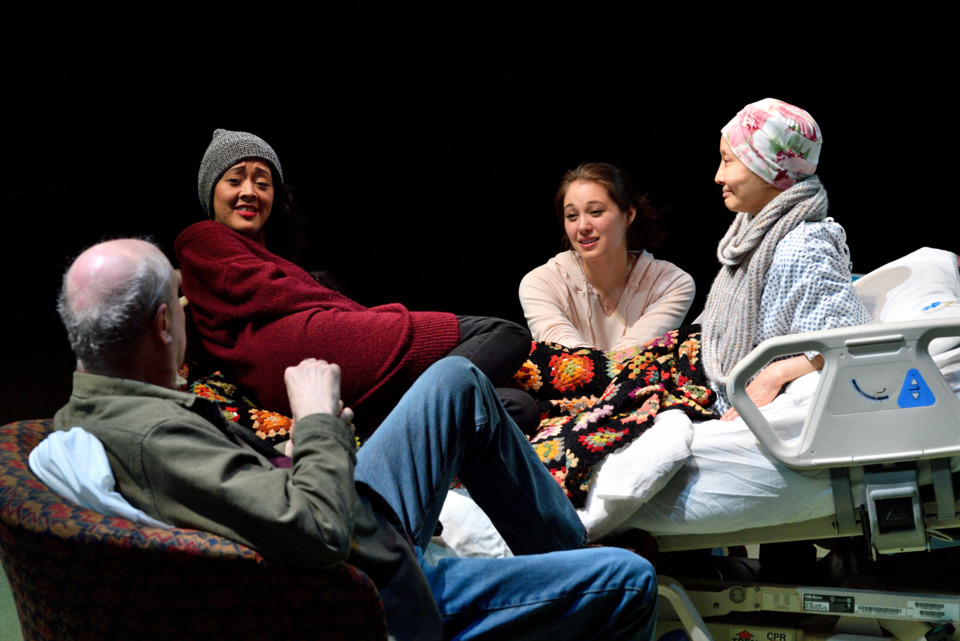by Rick Pender | published April 10, 2018
Inclusion was big this year, with virtually all the plays representing refreshingly nontraditional perspectives.
I travel to Louisville, Ky. annually to take the pulse of American theater at Actors Theatre, when it presents the Humana Festival of New American Plays. This year, it was held Feb. 28-April 8. These festivals have offered more than 300 world premieres in 42 years. There is seldom an overt theme. Instead, trends emerge, and that’s precisely what happened this year: Of the nine playwrights presented on one of the company’s three stages this year, six were women.
Last Friday, the festival’s final weekend kicked off with a panel by four literary managers — people who select scripts for theater companies — involved in founding The Kilroys, a Los Angeles-based set of playwrights and producers who advance gender parity in American theater. These women encouraged the weekend’s attendees from across the United States to embrace opportunities for female and trans writers, as well as for writers of color. The 2018 festival was a perfect moment for this message, since virtually all the plays represented refreshingly nontraditional perspectives.
In Susan Soon He Stanton’s we, the invisibles, the playwright (acted by Rinabeth Apostol) guided audiences through portraits of dozens of behind-the-scenes workers at hotels and restaurants. Six diverse actors portrayed a stunning array of women and people of color who are seldom appreciated or even noticed. The show also dug into the specifics of sexual harassment all too prevalent for many of these workers.
Mara Nelson-Greenberg’s Do You Feel Anger? put Sofia (Tiffany Villarin), a female empathy counselor, front and center, coping with an over-the-top office of weirdly unsympathetic employees at a debt collection agency. Their wildly absurd and inappropriate workplace behavior seemed hilarious at first, but became increasingly disconcerting as Sofia wrestled with their issues and her own.
Deborah Stein’s Marginal Loss used four actors to portray guilt-ridden workers from a stock-trading firm struggling to carry on business in the days immediately following 9/11, after many of their fellow workers died in the tragedy. Three female actors — one of Korean descent, one African-American, one Caucasian — played roles that were not race specific but surely belonged in this story.
The show I believe has considerable promise for subsequent production was Leah Nanako Winkler’s God Said This, about a fractured family coping with cancer. Two daughters come to their Japanese mother’s bedside as she undergoes chemotherapy; they’re estranged from their alcoholic father, an oddball Kentucky native who’s trying to make amends (played with power, humor and profound sensitivity by Jay Patterson). The show is not about race or gender, but it presented an emotionally powerful tale of family dynamics seldom played on theater stages in the past.
Even Mark Schultz’s Evocation to Visible Appearance, the final production staged by outgoing artistic director Les Waters, revolved around a distracted female teenager. The hard-to-watch tale of evil becoming incarnate severely divided audience opinion but, like each production in the 2018 festival, provided ample opportunities for nontraditional character portraits.
Even the festival’s annual showcase for Actors Theatre’s acting apprentices, You Across from Me, with a dozen table-themed playlets by Jaclyn Backhaus, Dipika Guha, Brian Otaño and Jason Gray Platt, had moments exploring changing gender roles — especially “The National Foosball Championships,” a delightful role-reversing satire on professional sports.
An annual element of the Humana Festival is the presentation of awards by the American Theatre Critics Association. This year, Chelsea Marcantel’s Airness from the 2017 festival received ATCA’s Osborn Award for an emerging playwright. That was timely for Cincinnati Playhouse. Last week, it announced a world-premiere production of Marcantel’s Tiny Houses will close its Shelterhouse’s 2018-19 season. That season will completely feature works by women.
Stories by women playwrights and writers of color are increasingly visible.
Contact Rick Pender: rpender@citybeat.com







